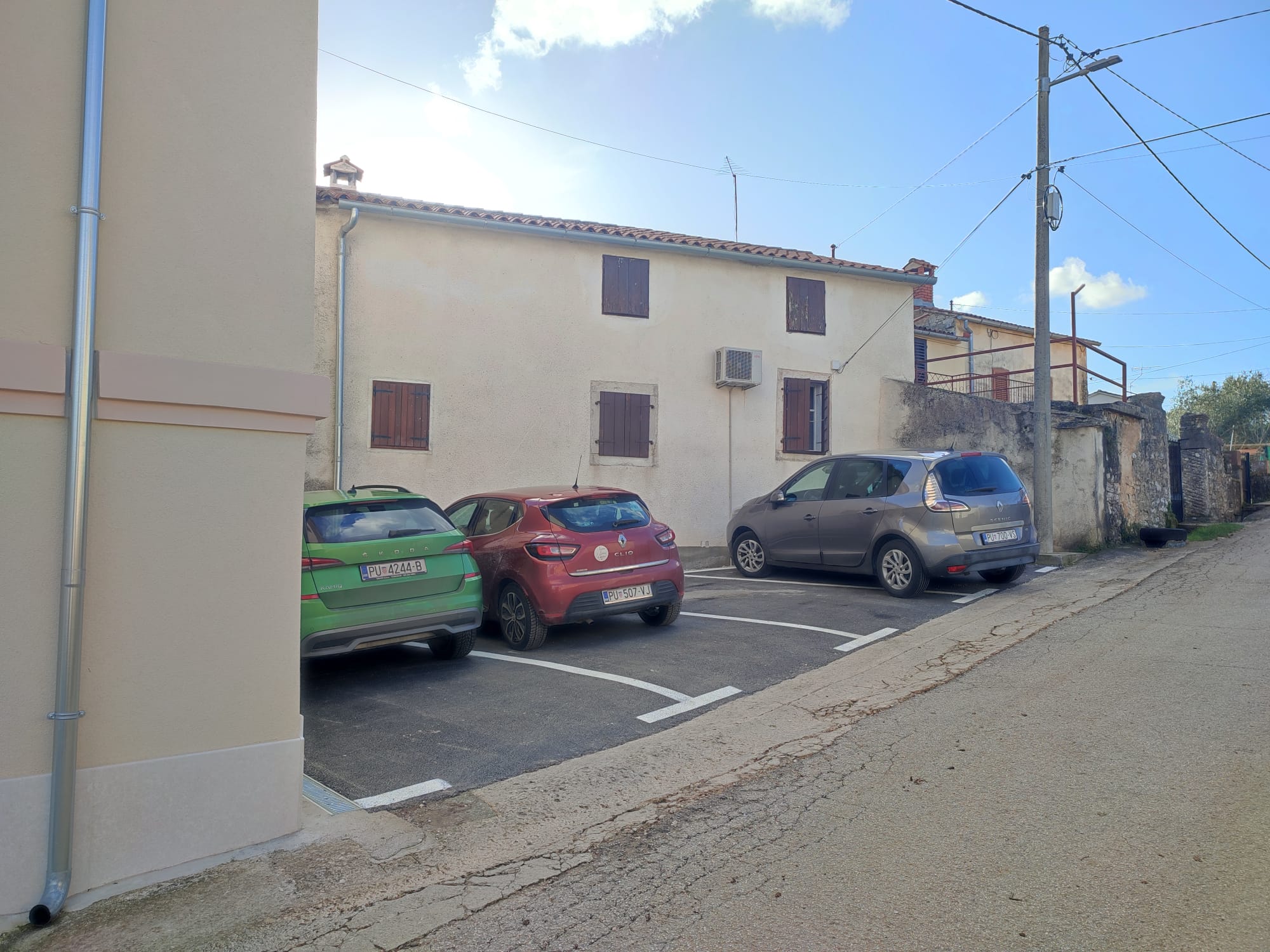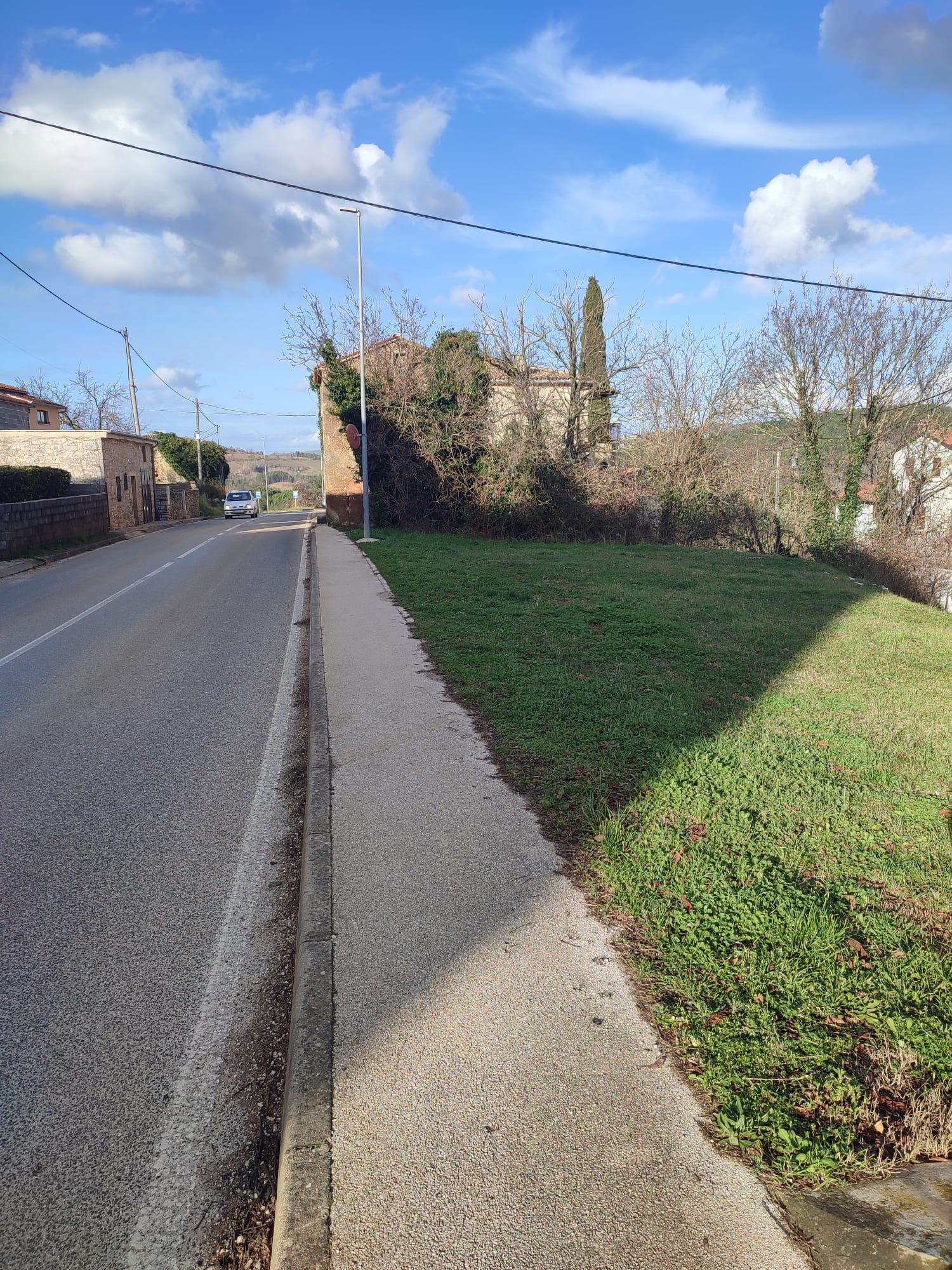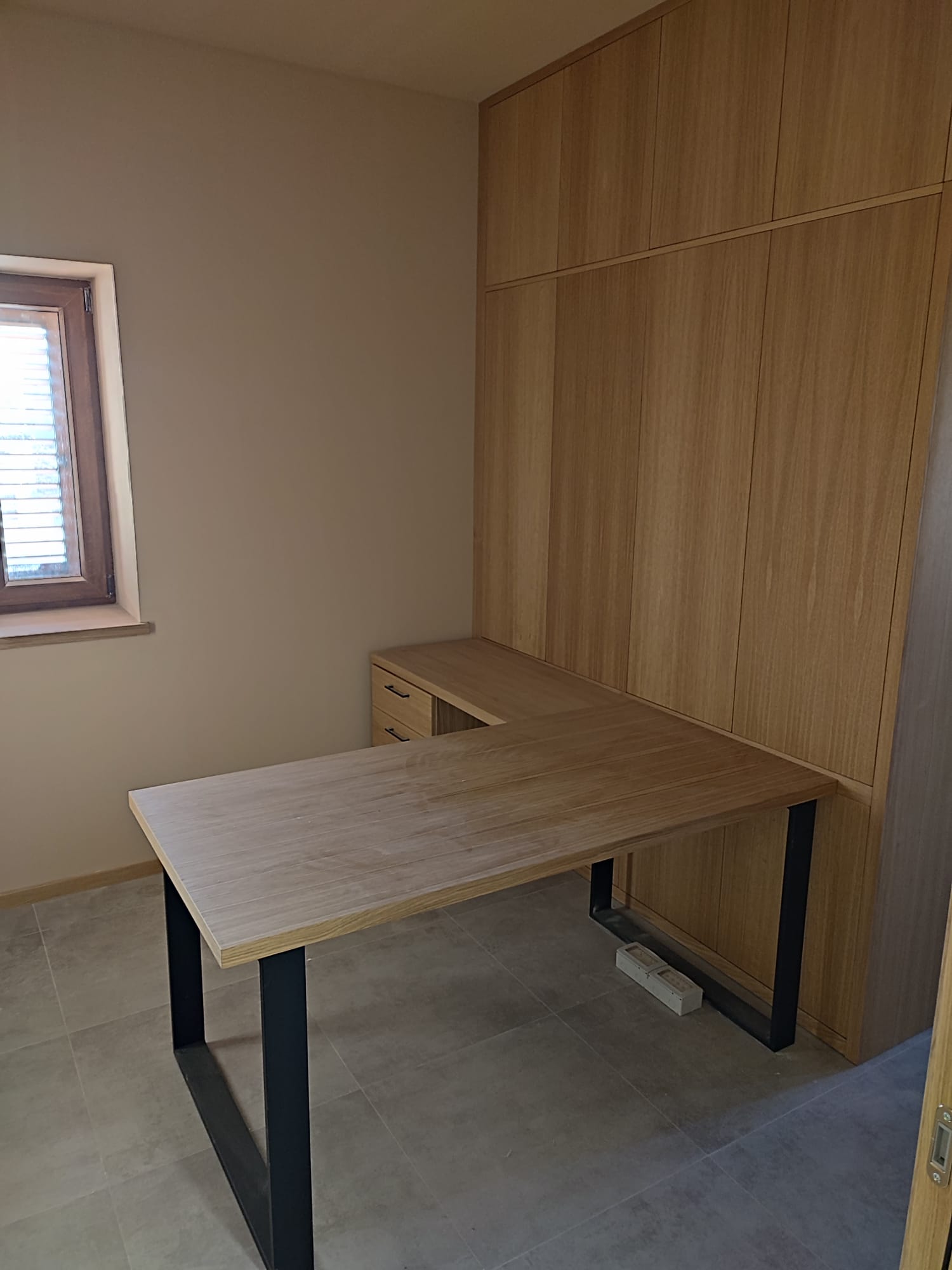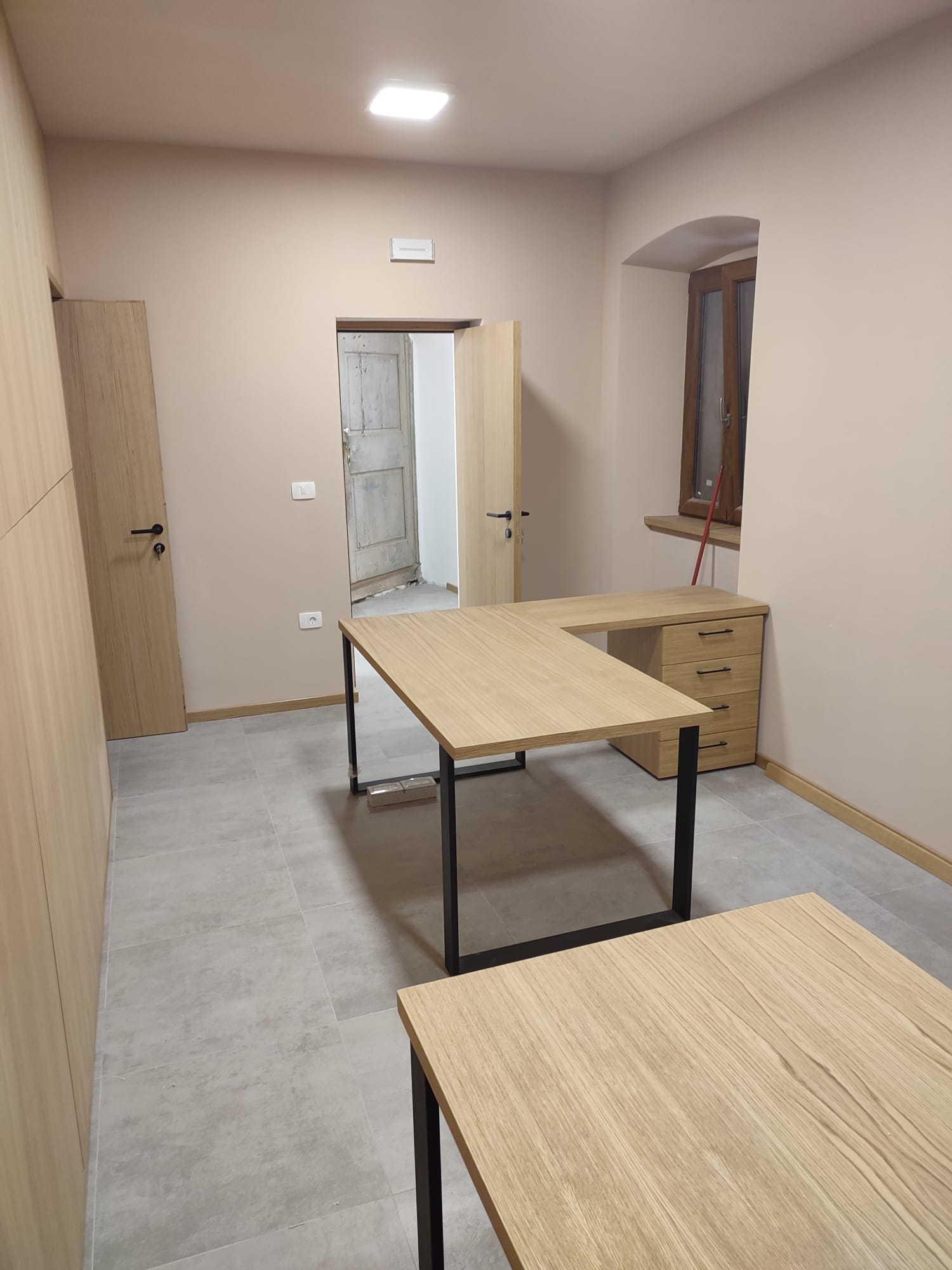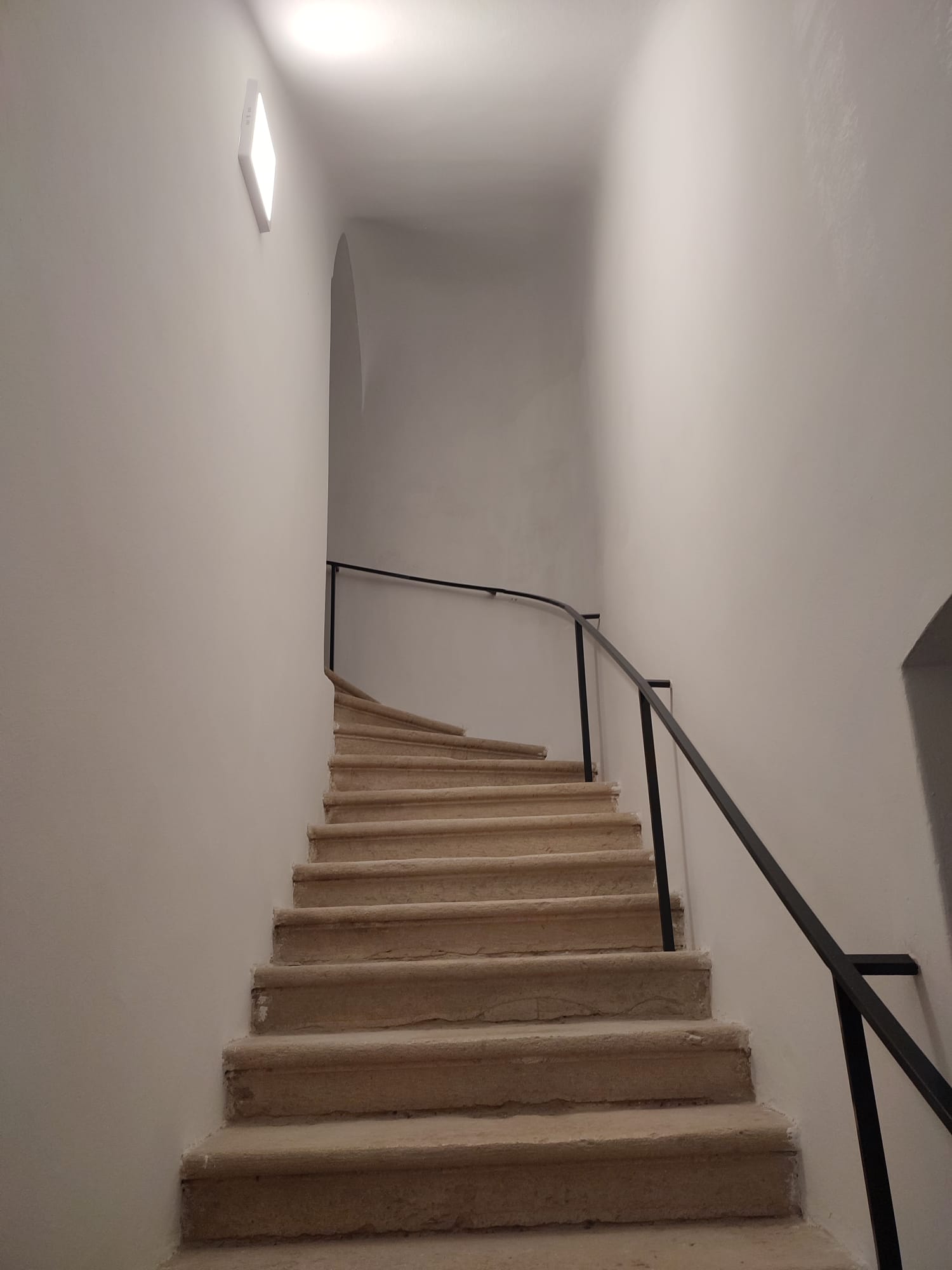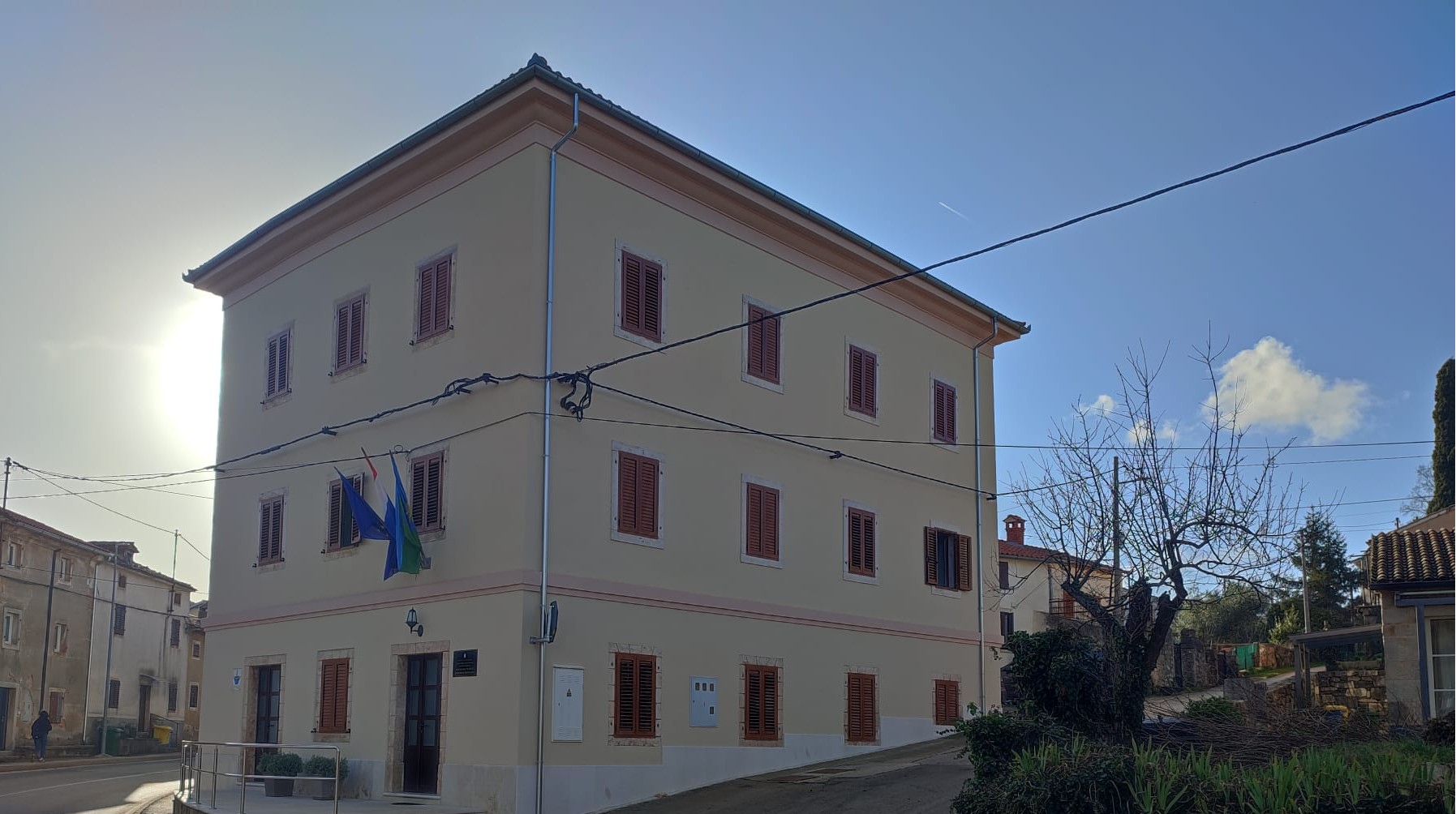Green HUB Karojba
Green HUB Karojba – A Renewable energy and sustainable living interpretation center
Green Hub Karojba is a vibrant center for renewable energy and sustainable living. Designed as an eco-friendly space, it promotes green innovation, supports local entrepreneurs and organizations, and educates the community on sustainable practices. With photovoltaic - solar roof, bike-friendly infrastructure, and natural materials, it embodies the future of green development. Join us in shaping a more sustainable tomorrow!
Croatia
Karojba 1
Prototype level
Yes
Yes
Yes
No
No
05967: Karojba (HR)
Green Hub Karojba is an innovative initiative promoting renewable energy and sustainable living in the Municipality of Karojba. Its mission is to encourage the implementation of green solutions by creating an educational and collaborative space for the community, businesses, and organizations through:
1. Interpretation center for RES in Municipality building
2. Cycling friendly parking area
3. Solar roofs - photovoltaic project development on municipality building roof
Target groups include local residents, entrepreneurs, associations, investors and individuals interested in adopting photovoltaic systems, energy-efficient practices, and sustainable mobility solutions. The initiative provides a real-life example of green transformation, as the municipal building itself will integrate photovoltaic panels and sustainable design features, inspiring visitors and residents alike.
Specific objectives of Green Hub Karojba are to:
Develop and promote energy-efficient solutions through education and practical examples (solar roof)
Encourage sustainable mobility by improving cycling infrastructure on new parking area
Provide a space for collaboration, work and learning for businesses, NGOs, and the community.
Raise awareness of renewable energy benefits and sustainable living practices.
Expected outcomes include increased community awareness and engagement in sustainability, a reduction in carbon footprint through the implementation of green technologies, and the creation of a model sustainable hub. In the short term, the municipal building will serve as a tangible demonstration of these principles, showcasing the application of renewable energy and eco-friendly materials in Interpretation center for renewable energy sources. In the long term, the initiative aims to inspire widespread adoption of green solutions throughout the municipality.
Green Hub Karojba serves as a catalyst for change, fostering a culture of sustainability and innovation in the region.
1. Interpretation center for RES in Municipality building
2. Cycling friendly parking area
3. Solar roofs - photovoltaic project development on municipality building roof
Target groups include local residents, entrepreneurs, associations, investors and individuals interested in adopting photovoltaic systems, energy-efficient practices, and sustainable mobility solutions. The initiative provides a real-life example of green transformation, as the municipal building itself will integrate photovoltaic panels and sustainable design features, inspiring visitors and residents alike.
Specific objectives of Green Hub Karojba are to:
Develop and promote energy-efficient solutions through education and practical examples (solar roof)
Encourage sustainable mobility by improving cycling infrastructure on new parking area
Provide a space for collaboration, work and learning for businesses, NGOs, and the community.
Raise awareness of renewable energy benefits and sustainable living practices.
Expected outcomes include increased community awareness and engagement in sustainability, a reduction in carbon footprint through the implementation of green technologies, and the creation of a model sustainable hub. In the short term, the municipal building will serve as a tangible demonstration of these principles, showcasing the application of renewable energy and eco-friendly materials in Interpretation center for renewable energy sources. In the long term, the initiative aims to inspire widespread adoption of green solutions throughout the municipality.
Green Hub Karojba serves as a catalyst for change, fostering a culture of sustainability and innovation in the region.
Sustainable Energy
Renewable energy sources
Circular Economy
Sustainable Mobility
Community engagement and education
Green Hub Karojba as an example of sustainability:
This initiative sets a standard for sustainability through concrete infrastructure projects, education, and a participatory community approach. By implementing photovoltaic panels, eco design (natural materials) and promoting the sustainable mobility though cycling infrastructure on new parking area near Parenzana bike route, Karojba becomes a model example of applying green solutions at the local level. Green Hub Karojba serves as an inspiration and practical guide for other communities looking to implement similar initiatives, demonstrating how local governments can lead the transition to sustainability.
Conclusion:
Green Hub Karojba represents a turning point in the development of the local community towards a greener future. Through infrastructure solutions (project for photovoltaic system in attachment; parking area visible in budget -att., education and collaboration), the center will be a key hub for promoting ecological awareness and innovative sustainable initiatives. Municipality Karojba wants to boost development, but in a sustainable way, leaving a bright future for new generations.
This initiative sets a standard for sustainability through concrete infrastructure projects, education, and a participatory community approach. By implementing photovoltaic panels, eco design (natural materials) and promoting the sustainable mobility though cycling infrastructure on new parking area near Parenzana bike route, Karojba becomes a model example of applying green solutions at the local level. Green Hub Karojba serves as an inspiration and practical guide for other communities looking to implement similar initiatives, demonstrating how local governments can lead the transition to sustainability.
Conclusion:
Green Hub Karojba represents a turning point in the development of the local community towards a greener future. Through infrastructure solutions (project for photovoltaic system in attachment; parking area visible in budget -att., education and collaboration), the center will be a key hub for promoting ecological awareness and innovative sustainable initiatives. Municipality Karojba wants to boost development, but in a sustainable way, leaving a bright future for new generations.
Aesthetics and quality of experience:
Green Hub Karojba is designed to create an inviting and harmonious space that integrates aesthetics with functionality, fostering positive emotions and cultural benefits for the community. The use of natural materials such as wood and metal not only ensures sustainability but also provides a warm and welcoming atmosphere, enhancing the overall experience for visitors and users.
The building’s design prioritizes natural elements to create a sense of connection with nature. The incorporation of photovoltaic panels seamlessly blends renewable energy solutions with modern architecture, demonstrating that sustainability can be both functional and visually appealing.
Cultural enrichment is a key aspect of the initiative, as the hub serves as a gathering place for local NGOs, educators, and innovators to engage with the community through workshops and events centered on sustainability. By promoting a culture of environmental awareness and responsibility, Green Hub Karojba strengthens the identity of the region as a forward-thinking and environmentally conscious community.
As an exemplary project, Green Hub Karojba showcases how thoughtful design, sustainability, and community engagement can merge into a space that is both beautiful and impactful. By fostering creativity, social interaction, and environmental responsibility, the initiative sets a new standard for integrating green infrastructure with cultural and social value. Through investment on parking are (public area that will be transform), Municipality will install cycling infrastructure that promotes the beauty of Parenzana bike route only 1 km away.
In order to keep welcoming atmosphere in the offices, Municipality will set the promotional and educational materials, esspecially if the Prize is won which confirms that sustainable solutions are always a good idea.
Green Hub Karojba is designed to create an inviting and harmonious space that integrates aesthetics with functionality, fostering positive emotions and cultural benefits for the community. The use of natural materials such as wood and metal not only ensures sustainability but also provides a warm and welcoming atmosphere, enhancing the overall experience for visitors and users.
The building’s design prioritizes natural elements to create a sense of connection with nature. The incorporation of photovoltaic panels seamlessly blends renewable energy solutions with modern architecture, demonstrating that sustainability can be both functional and visually appealing.
Cultural enrichment is a key aspect of the initiative, as the hub serves as a gathering place for local NGOs, educators, and innovators to engage with the community through workshops and events centered on sustainability. By promoting a culture of environmental awareness and responsibility, Green Hub Karojba strengthens the identity of the region as a forward-thinking and environmentally conscious community.
As an exemplary project, Green Hub Karojba showcases how thoughtful design, sustainability, and community engagement can merge into a space that is both beautiful and impactful. By fostering creativity, social interaction, and environmental responsibility, the initiative sets a new standard for integrating green infrastructure with cultural and social value. Through investment on parking are (public area that will be transform), Municipality will install cycling infrastructure that promotes the beauty of Parenzana bike route only 1 km away.
In order to keep welcoming atmosphere in the offices, Municipality will set the promotional and educational materials, esspecially if the Prize is won which confirms that sustainable solutions are always a good idea.
Inclusion and accessibility
- Green Hub Karojba is designed as an inclusive space that is accessible to all members of the community, regardless of their socio-economic background, age, or professional status. The initiative actively promotes affordability and accessibility by ensuring that participation in educational programs, workshops, and networking events remains free.
The project also embraces participatory governance, ensuring that decision-making processes include input from various stakeholders. In collaboration with the Development Agency Heart of Istria, Green Hub Karojba has hosted events such as “Participatory Governance of Entrepreneurial Infrastructure: Young Entrepreneurs in Dialogue with Decision-Makers.” These discussions create a direct link between young entrepreneurs and local policymakers, fostering an environment where ideas and policy solutions for economic and environmental sustainability are co-created.
By hosting regular public discussions, workshops, and forums, the initiative ensures that all voices in the community are heard, reinforcing democratic decision-making and promoting inclusive economic growth. The hub is also designed using “design for all” principles, with accessible facilities and infrastructure that cater to diverse needs, including those of individuals with disabilities.
As an exemplary model, Green Hub Karojba demonstrates how sustainability initiatives can be both environmentally responsible and socially inclusive. By connecting different societal groups, promoting affordability, and embedding participatory governance into its framework, the initiative serves as a blueprint for other cities striving to develop inclusive, community-driven sustainability projects.
- Green Hub Karojba is designed as an inclusive space that is accessible to all members of the community, regardless of their socio-economic background, age, or professional status. The initiative actively promotes affordability and accessibility by ensuring that participation in educational programs, workshops, and networking events remains free.
The project also embraces participatory governance, ensuring that decision-making processes include input from various stakeholders. In collaboration with the Development Agency Heart of Istria, Green Hub Karojba has hosted events such as “Participatory Governance of Entrepreneurial Infrastructure: Young Entrepreneurs in Dialogue with Decision-Makers.” These discussions create a direct link between young entrepreneurs and local policymakers, fostering an environment where ideas and policy solutions for economic and environmental sustainability are co-created.
By hosting regular public discussions, workshops, and forums, the initiative ensures that all voices in the community are heard, reinforcing democratic decision-making and promoting inclusive economic growth. The hub is also designed using “design for all” principles, with accessible facilities and infrastructure that cater to diverse needs, including those of individuals with disabilities.
As an exemplary model, Green Hub Karojba demonstrates how sustainability initiatives can be both environmentally responsible and socially inclusive. By connecting different societal groups, promoting affordability, and embedding participatory governance into its framework, the initiative serves as a blueprint for other cities striving to develop inclusive, community-driven sustainability projects.
The initiative actively involves the local community through participatory events, workshops, and consultations. One key example is already organised discussions in April 2024 at the Municipality of Karojba, where entrepreneurs and artisans from the region engaged with decision-makers to co-create policies and incentives for sustainable business development. This event follows a successful collaboration with the Development Agency Heart of Istria on participatory governance in entrepreneurial infrastructure.
Additionally, the parking area will feature information about the Parenzana cycling route, further promoting sustainable mobility and raising awareness about eco-friendly transportation options. By embedding sustainability within public infrastructure and fostering dialogue between stakeholders, Green Hub Karojba strengthens community ownership of green initiatives and serves as a model for citizen-driven environmental transformation.
Additionally, the parking area will feature information about the Parenzana cycling route, further promoting sustainable mobility and raising awareness about eco-friendly transportation options. By embedding sustainability within public infrastructure and fostering dialogue between stakeholders, Green Hub Karojba strengthens community ownership of green initiatives and serves as a model for citizen-driven environmental transformation.
Green Hub Karojba was developed through a multi-level engagement strategy involving local, regional, national, and European stakeholders. At the local level, the Municipality of Karojba plays a central role in coordinating the initiative, while engaging residents, businesses, and community organizations through events (i.e. the one with Development agency Heart of Istria). The project is also supported by the Istrian Region, which provides strategic guidance and aligns the initiative with broader regional sustainability goals.
The Local Action Group (LAG) has been a key partner in connecting rural development initiatives with Green Hub Karojba, ensuring that local businesses and entrepreneurs benefit from the center’s resources. At the national level, the project aligns with Croatia’s sustainability and energy transition strategies, attracting interest from policy advisors and institutions promoting renewable energy and green infrastructure.
On the European level, Green Hub Karojba reflects the core values of the New European Bauhaus, serving as a best-practice model for integrating sustainability, aesthetics, and inclusivity in local development. The project also seeks to engage with EU-funded initiatives, knowledge-sharing platforms, and networks focused on sustainability, ensuring ongoing collaboration and the dissemination of best practices across European communities.
The Local Action Group (LAG) has been a key partner in connecting rural development initiatives with Green Hub Karojba, ensuring that local businesses and entrepreneurs benefit from the center’s resources. At the national level, the project aligns with Croatia’s sustainability and energy transition strategies, attracting interest from policy advisors and institutions promoting renewable energy and green infrastructure.
On the European level, Green Hub Karojba reflects the core values of the New European Bauhaus, serving as a best-practice model for integrating sustainability, aesthetics, and inclusivity in local development. The project also seeks to engage with EU-funded initiatives, knowledge-sharing platforms, and networks focused on sustainability, ensuring ongoing collaboration and the dissemination of best practices across European communities.
Green Hub Karojba integrates multiple disciplines and knowledge fields, creating a holistic approach to sustainable development. The key fields involved in the project include:
Renewable energy and engineering: The initiative is centered around photovoltaic technology, with a project developed by Rudan d.o.o., a well-known company in sustainable energy solutions. Their expertise ensures optimal energy efficiency and technical implementation.
Architecture and urban planning: The design of the hub emphasizes eco-friendly construction materials and accessibility, ensuring aesthetic and functional quality aligned with New European Bauhaus principles.
Environmental science: Sustainability assessments and eco-conscious choices drive decision-making processes.
Economics and business development: The project provides support to entrepreneurs and SMEs interested in sustainable business practices, fostering local economic growth in municipal Interpretation RES center where local entrepreneurs and NGOs will be able to develop and exchange their ideas.
Community engagement and governance: Through participatory discussions and collaborations with regional authorities and local action group, the initiative strengthens citizen involvement in decision-making.
The collaboration between experts from these fields has added value by ensuring a well-rounded, impactful, and innovative approach. By combining technological advancements with social and environmental considerations, Green Hub Karojba sets a benchmark for interdisciplinary cooperation in sustainable development.
Strategic planning - in Operational and action plan 2022.-2025. (in att.) Municipality Karojba set the directon of Green transition focusing on development of initiatives contributing to climate neutrality. Green Hub Karojba is in line with this measure.
Renewable energy and engineering: The initiative is centered around photovoltaic technology, with a project developed by Rudan d.o.o., a well-known company in sustainable energy solutions. Their expertise ensures optimal energy efficiency and technical implementation.
Architecture and urban planning: The design of the hub emphasizes eco-friendly construction materials and accessibility, ensuring aesthetic and functional quality aligned with New European Bauhaus principles.
Environmental science: Sustainability assessments and eco-conscious choices drive decision-making processes.
Economics and business development: The project provides support to entrepreneurs and SMEs interested in sustainable business practices, fostering local economic growth in municipal Interpretation RES center where local entrepreneurs and NGOs will be able to develop and exchange their ideas.
Community engagement and governance: Through participatory discussions and collaborations with regional authorities and local action group, the initiative strengthens citizen involvement in decision-making.
The collaboration between experts from these fields has added value by ensuring a well-rounded, impactful, and innovative approach. By combining technological advancements with social and environmental considerations, Green Hub Karojba sets a benchmark for interdisciplinary cooperation in sustainable development.
Strategic planning - in Operational and action plan 2022.-2025. (in att.) Municipality Karojba set the directon of Green transition focusing on development of initiatives contributing to climate neutrality. Green Hub Karojba is in line with this measure.
Green Hub Karojba stands out as an innovative initiative in the field of renewable energy and sustainable development by integrating technological advancements, participatory governance, and a holistic approach to community-driven sustainability. Unlike traditional energy-efficiency projects that focus solely on infrastructure upgrades, this initiative embeds sustainability into local governance, education, and everyday practices.
Key innovations include:
• A Demonstration site for sustainable siving: The municipal building itself serves as a model, showcasing best practices in energy efficiency, sustainable materials, and renewable energy solutions (solar roof), making green technologies accessible and understandable to the public.
• Participatory governance and community ownership: The initiative actively involves citizens, entrepreneurs, and local decision-makers through structured dialogues and public consultations, ensuring policies and investments reflect real community needs.
• Integration of sustainable mobility: Beyond energy efficiency, the initiative promotes sustainable transport solutions, such as bicycle infrastructure and multimodal options, linked to the Parenzana cycling route, encouraging eco-friendly mobility choices.
• Multidisciplinary and cross-sector collaboration: Combining expertise from engineering, architecture, business development and governance, Green Hub Karojba ensures a comprehensive approach that balances environmental, economic, and social sustainability.
• Scalability and replicability: The initiative is designed as a blueprint for other municipalities looking to implement local sustainability hubs, offering a replicable model that can be adapted across different contexts in Europe.
By merging innovative technology with community engagement, Green Hub Karojba sets a new standard for sustainabile development throuht Interpretation center for RES. (In annual budget: "interpretacijski centar za obnovljive izvore energije)
Key innovations include:
• A Demonstration site for sustainable siving: The municipal building itself serves as a model, showcasing best practices in energy efficiency, sustainable materials, and renewable energy solutions (solar roof), making green technologies accessible and understandable to the public.
• Participatory governance and community ownership: The initiative actively involves citizens, entrepreneurs, and local decision-makers through structured dialogues and public consultations, ensuring policies and investments reflect real community needs.
• Integration of sustainable mobility: Beyond energy efficiency, the initiative promotes sustainable transport solutions, such as bicycle infrastructure and multimodal options, linked to the Parenzana cycling route, encouraging eco-friendly mobility choices.
• Multidisciplinary and cross-sector collaboration: Combining expertise from engineering, architecture, business development and governance, Green Hub Karojba ensures a comprehensive approach that balances environmental, economic, and social sustainability.
• Scalability and replicability: The initiative is designed as a blueprint for other municipalities looking to implement local sustainability hubs, offering a replicable model that can be adapted across different contexts in Europe.
By merging innovative technology with community engagement, Green Hub Karojba sets a new standard for sustainabile development throuht Interpretation center for RES. (In annual budget: "interpretacijski centar za obnovljive izvore energije)
The methodology is based on three key pillars: community engagement, applied sustainability, and knowledge-sharing.
1. Community engagement and participatory governance
- the initiative actively involves local residents, entrepreneurs, and stakeholders in decision-making processes. Through public consultations, workshops, and participatory events—such as the 2024 discussion on entrepreneurial infrastructure—Green Hub Karojba ensures that the needs and ideas of the community are incorporated into its development. This bottom-up approach fosters a sense of ownership and encourages long-term commitment to sustainability practices.
2. Applied sustainability and green infrastructure
- the project integrates sustainable practices directly into the municipal building and surrounding infrastructure. The selection of natural materials (wood and metal), the installation of a photovoltaic system, and the development of a bicycle-friendly parking area exemplify the commitment to energy efficiency and sustainable mobility. By making these elements visible and accessible, the initiative provides a hands-on learning experience for visitors and stakeholders.
3. Interdisciplinary collaboration and knowledge exchange
- the development of Green Hub Karojba involves cooperation between multiple disciplines, including environmental engineering, architecture, business development, and policy-making. A key example is the project by Rudan d.o.o., a national leader in sustainable energy solutions, which developed the photovoltaic project. By connecting expertise from different fields, the initiative fosters innovation and enhances the practical implementation of green technologies.
4. Scalability and replicability
- the Green Hub Karojba model is designed to be replicable in other municipalities. By documenting best practices, sharing insights through regional and European networks, and engaging with institutions, the initiative aims to inspire similar sustainability projects
1. Community engagement and participatory governance
- the initiative actively involves local residents, entrepreneurs, and stakeholders in decision-making processes. Through public consultations, workshops, and participatory events—such as the 2024 discussion on entrepreneurial infrastructure—Green Hub Karojba ensures that the needs and ideas of the community are incorporated into its development. This bottom-up approach fosters a sense of ownership and encourages long-term commitment to sustainability practices.
2. Applied sustainability and green infrastructure
- the project integrates sustainable practices directly into the municipal building and surrounding infrastructure. The selection of natural materials (wood and metal), the installation of a photovoltaic system, and the development of a bicycle-friendly parking area exemplify the commitment to energy efficiency and sustainable mobility. By making these elements visible and accessible, the initiative provides a hands-on learning experience for visitors and stakeholders.
3. Interdisciplinary collaboration and knowledge exchange
- the development of Green Hub Karojba involves cooperation between multiple disciplines, including environmental engineering, architecture, business development, and policy-making. A key example is the project by Rudan d.o.o., a national leader in sustainable energy solutions, which developed the photovoltaic project. By connecting expertise from different fields, the initiative fosters innovation and enhances the practical implementation of green technologies.
4. Scalability and replicability
- the Green Hub Karojba model is designed to be replicable in other municipalities. By documenting best practices, sharing insights through regional and European networks, and engaging with institutions, the initiative aims to inspire similar sustainability projects
Several key elements can be transferred to different contexts:
1. Participatory governance an community engagement
- the initiative’s participatory model—where local governments, businesses, and citizens co-create sustainability strategies—can be adopted by other municipalities. Events such as the 2024 discussions with young entrepreneurs demonstrate how inclusive policymaking strengthens community ownership and long-term impact.
2. Green public infrastructure and renewable energy
- the use of photovoltaic systems, eco-friendly office materials, and bicycle-friendly infrastructure provides a blueprint for transforming public buildings and infrastructure into sustainability showcases. Other local governments can replicate this model to demonstrate practical energy solutions while promoting sustainable mobility.
3. Interdisciplinary collaboration and knowledge sharing
- by involving experts in renewable energy, architecture and policy, Green Hub Karojba fosters cross-sector cooperation. Rudan d.o.o., a national leader in sustainable solutions, shows how technical expertise enhances local projects. This model can be applied in other regions to maximize impact.
4. Educational and awareness initiatives
- Green Hub Karojba serves as a center for knowledge-sharing on energy efficiency and sustainable living. Its open-access approach—allowing residents, entrepreneurs and associations to learn and exchange ideas—can be replicated in other community hubs or schools, promoting sustainability education.
5. Integration with regional and european networks
- the initiative aligns with broader sustainability strategies, engaging regional institutions such as the Istrian Region and Local Action Groups (LAGs). This collaborative approach can be scaled through EU-funded initiatives, cross-border knowledge-sharing platforms, and partnerships with similar green hubs across Europe.
1. Participatory governance an community engagement
- the initiative’s participatory model—where local governments, businesses, and citizens co-create sustainability strategies—can be adopted by other municipalities. Events such as the 2024 discussions with young entrepreneurs demonstrate how inclusive policymaking strengthens community ownership and long-term impact.
2. Green public infrastructure and renewable energy
- the use of photovoltaic systems, eco-friendly office materials, and bicycle-friendly infrastructure provides a blueprint for transforming public buildings and infrastructure into sustainability showcases. Other local governments can replicate this model to demonstrate practical energy solutions while promoting sustainable mobility.
3. Interdisciplinary collaboration and knowledge sharing
- by involving experts in renewable energy, architecture and policy, Green Hub Karojba fosters cross-sector cooperation. Rudan d.o.o., a national leader in sustainable solutions, shows how technical expertise enhances local projects. This model can be applied in other regions to maximize impact.
4. Educational and awareness initiatives
- Green Hub Karojba serves as a center for knowledge-sharing on energy efficiency and sustainable living. Its open-access approach—allowing residents, entrepreneurs and associations to learn and exchange ideas—can be replicated in other community hubs or schools, promoting sustainability education.
5. Integration with regional and european networks
- the initiative aligns with broader sustainability strategies, engaging regional institutions such as the Istrian Region and Local Action Groups (LAGs). This collaborative approach can be scaled through EU-funded initiatives, cross-border knowledge-sharing platforms, and partnerships with similar green hubs across Europe.
1. Climate change and renewable energy transition
- reducing carbon emissions and increasing energy efficiency are global priorities. Green Hub Karojba addresses this by installing a photovoltaic system on the municipal building, demonstrating the potential of solar energy for public and private sectors. By showcasing a fully operational renewable energy model, the initiative encourages local adoption of clean energy technologies, reducing reliance on fossil fuels.
2. Sustainable mobility and urban development
- urban congestion and transport emissions are major environmental concerns. Green Hub Karojba integrates bicycle-friendly infrastructure, including a parking area linked to the Parenzana cycling route, encouraging eco-friendly mobility. This promotes healthier lifestyles and reduces car dependency, aligning with European sustainable transport strategies.
3. Resource efficiency and circular economy
- overconsumption and waste are key global issues. The project demonstrates sustainable construction by using natural materials like wood and metal, eliminating plastic and harmful substances. This low-waste, eco-conscious approach serves as a replicable model for public and private buildings seeking to minimize environmental impact.
4. Inclusive governance and community empowerment
- sustainable transitions require public participation. Green Hub Karojba fosters inclusive decision-making through events like Young Entrepreneurs in Dialogue with Decision-Makers, where local businesses and policymakers co-create sustainability strategies. This participatory governance model strengthens community ownership and ensures lasting impact.
5. Alignment with global sustainability goals
The initiative directly supports the European Green Deal, the UN Sustainable Development Goals (SDGs), and the New European Bauhaus principles by integrating sustainability, aesthetics, and inclusivity into local development.
- reducing carbon emissions and increasing energy efficiency are global priorities. Green Hub Karojba addresses this by installing a photovoltaic system on the municipal building, demonstrating the potential of solar energy for public and private sectors. By showcasing a fully operational renewable energy model, the initiative encourages local adoption of clean energy technologies, reducing reliance on fossil fuels.
2. Sustainable mobility and urban development
- urban congestion and transport emissions are major environmental concerns. Green Hub Karojba integrates bicycle-friendly infrastructure, including a parking area linked to the Parenzana cycling route, encouraging eco-friendly mobility. This promotes healthier lifestyles and reduces car dependency, aligning with European sustainable transport strategies.
3. Resource efficiency and circular economy
- overconsumption and waste are key global issues. The project demonstrates sustainable construction by using natural materials like wood and metal, eliminating plastic and harmful substances. This low-waste, eco-conscious approach serves as a replicable model for public and private buildings seeking to minimize environmental impact.
4. Inclusive governance and community empowerment
- sustainable transitions require public participation. Green Hub Karojba fosters inclusive decision-making through events like Young Entrepreneurs in Dialogue with Decision-Makers, where local businesses and policymakers co-create sustainability strategies. This participatory governance model strengthens community ownership and ensures lasting impact.
5. Alignment with global sustainability goals
The initiative directly supports the European Green Deal, the UN Sustainable Development Goals (SDGs), and the New European Bauhaus principles by integrating sustainability, aesthetics, and inclusivity into local development.
The next phase of Green Hub Karojba focuses on further embedding sustainability, inclusion, and aesthetics in the local community through concrete actions and public engagement.
Completed steps:
Office spaces have been furnished with sustainable materials (wood and metal, no plastic).
Photovoltaic system project has been finalized to enable renewable energy use.
Upcoming Steps:
Construction of a sustainable parking area with bicycle infrastructure to promote eco-mobility and reinforce the connection with the Parenzana cycling route.
Establishment of the Renewable Energy Sources Interpretation Center, where associations, entrepreneurs, and citizens can work, learn, and exchange knowledge on sustainable practices and energy transition (including educational and promotional materials)
A public event will be organized to inform citizens about completed and upcoming actions, highlighting investment plans, sustainability goals, and NEB principles in practice. This event will facilitate direct engagement with stakeholders and further develop participatory governance.
NEB Values in Action:
Sustainability – The initiative prioritizes energy efficiency, circular economy, and eco-mobility, setting an example for green urban planning.
Inclusion – Through participatory events, citizens actively co-create sustainability solutions alongside decision-makers.
Aesthetics – The project integrates eco-conscious materials and design to create a space that is both functional and inspiring.
By aligning future actions with NEB principles, Green Hub Karojba ensures that local sustainability efforts become a replicable model for other communities in Europe.
Completed steps:
Office spaces have been furnished with sustainable materials (wood and metal, no plastic).
Photovoltaic system project has been finalized to enable renewable energy use.
Upcoming Steps:
Construction of a sustainable parking area with bicycle infrastructure to promote eco-mobility and reinforce the connection with the Parenzana cycling route.
Establishment of the Renewable Energy Sources Interpretation Center, where associations, entrepreneurs, and citizens can work, learn, and exchange knowledge on sustainable practices and energy transition (including educational and promotional materials)
A public event will be organized to inform citizens about completed and upcoming actions, highlighting investment plans, sustainability goals, and NEB principles in practice. This event will facilitate direct engagement with stakeholders and further develop participatory governance.
NEB Values in Action:
Sustainability – The initiative prioritizes energy efficiency, circular economy, and eco-mobility, setting an example for green urban planning.
Inclusion – Through participatory events, citizens actively co-create sustainability solutions alongside decision-makers.
Aesthetics – The project integrates eco-conscious materials and design to create a space that is both functional and inspiring.
By aligning future actions with NEB principles, Green Hub Karojba ensures that local sustainability efforts become a replicable model for other communities in Europe.

